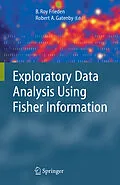The basic goal of a research scientist is to understand a given, unknown system. This innovative book develops a systematic approach for achieving this goal. All science is ultimately dependent upon observation which, in turn, requires a flow of information. Fisher information, in particular, is found to provide the key to understanding the system. It is developed as a new tool of exploratory data analysis, and is applied to a wide scope of systems problems. These range from molecules in a gas to biological organisms in their ecologies, to the socio-economic organization of people in their societies, to the physical constants in the universe and, ultimately, to proto-universes in the multiverse.
Examples of system input-output laws discovered by the approach include the famous quarter-power laws of biology and the Tobin q-theory of optimized economic investment. System likelihood laws that can be determined include the probability density functions defining in situ cancer growth and a wide class of systems (thermodynamic, economic, cryptographic) obeying Schrodinger-like equations. Novel uncertainty principles in the fields of biology and economics are also found to hold.
B. Roy Frieden and Robert A. Gatenby are professors at the University of Arizona. Frieden is in the College of Optics, and Gatenby is Chairman of the Radiology Dept. at the Arizona Health Sciences Center. Frieden has pioneered the use of information for developing image restoration approaches, and for understanding the physics of unknown systems, both nonliving and living. Gatenby has actively promoted the study of information as a determinant of healthy and malignant growth processes, and has developed integrated mathematical models and empirical techniques for this purpose.
Autorentext
Professor Emeritus - B. Roy Frieden:
B.S., M.S., Ph.D., Professor of Optical Sciences, Univ. of Arizona 1966-2002; books "Probability, Statistical Optics and Data Testing" (Springer-Verlag, 3rd ed., 2001), "Physics from Fisher Information" (Cambridge Univ. Press, 1998), "Science from Fisher Information" (Cambridge Univ. Press, 2004); inventor of principle of Extreme physical information (EPI)
Dr. Robert A. Gatenby:
BSE, Princeton Univ. MD, University of Pennsylvania.
Zusammenfassung
This book uses a mathematical approach to deriving the laws of science and technology that is based upon the concept of Fisher information.
The approach that follows from these ideas is called the principle of Extreme Physical Information (EPI). It is shown how to use EPI to determine the theoretical input output laws of unknown systems. Depending upon the system, these laws can be deterministic or stochastic and applicable to data used in many complex computational systems. Not only does information characterize the amount and quality of their data, but much more basically it can be used to analytically determine how the data arises out of the system, by the EPI principle. The book can be profitably read by someone whose level of math is at the level of an undergraduate degree in science or engineering.
Inhalt
to Fisher Information: Its Origin, Uses, and Predictions.- Financial Economics from Fisher Information.- Growth Characteristics of Organisms.- Information and Thermal Physics.- Parallel Information Phenomena of Biology and Astrophysics.- Encryption of Covert Information Through a Fisher Game.- Applications of Fisher Information to the Management of Sustainable Environmental Systems.- Fisher Information in Ecological Systems.- Sociohistory: An Information Theory of Social Changef.
